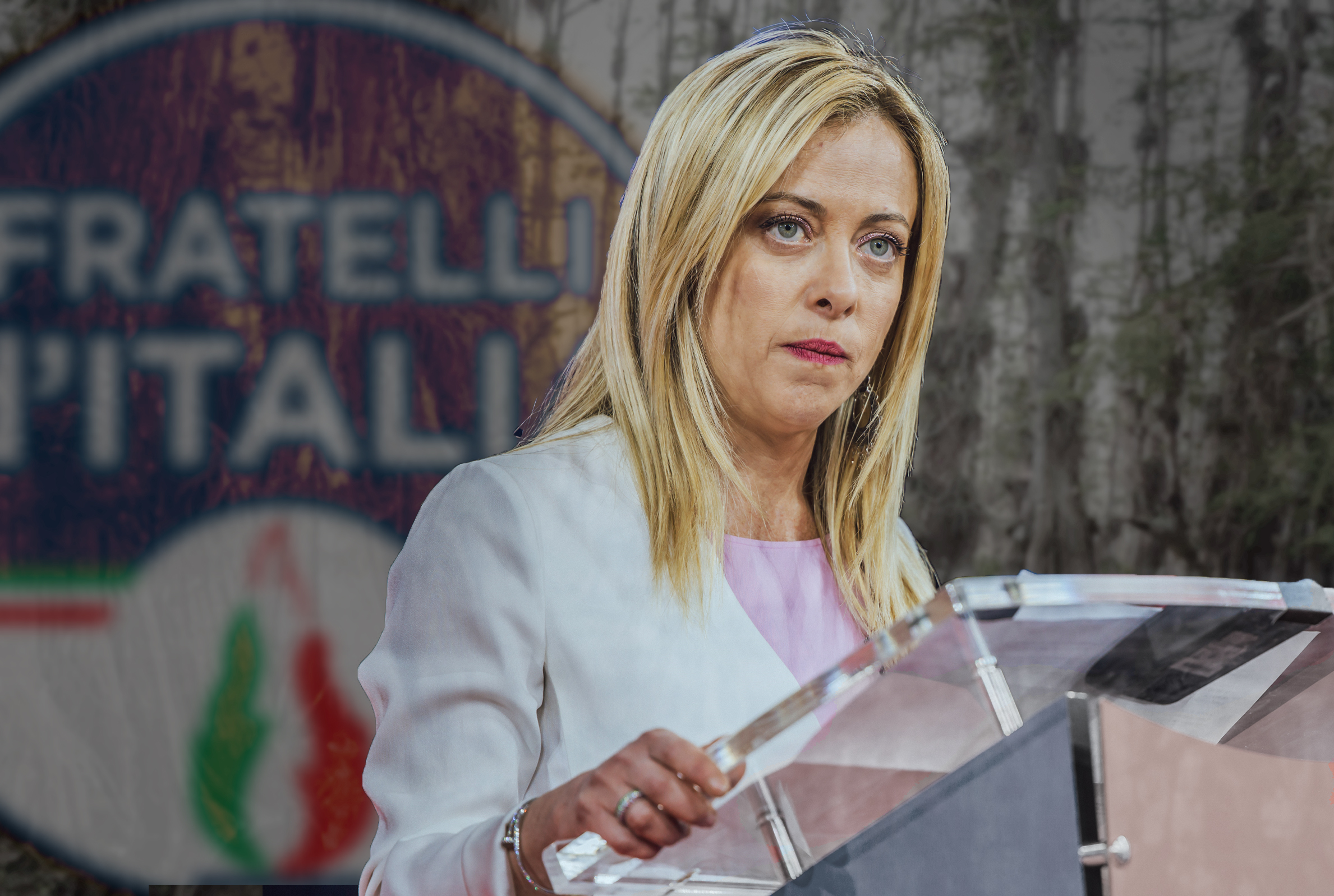The fall of the Draghi government in Italy has resulted in snap elections being called for 25 September. While panic abounds about the inevitable victory of a right-wing coalition led by Meloni’s “Brothers of Italy” party, the fact is that workers and youth have few illusions that a change at the top will improve their situation, which has become increasingly desperate. A lack of leadership from the left and trade union tops means workers will have to take the fight to defend their wages and conditions to the streets. Almighty class struggle is implicit in this situation.
Read the original in Italian |
In the abstract, the elections on 25 September should be attracting a lot of attention. They have been called to resolve a parliamentary crisis that, for the first time in the history of the republic, has led to an autumn election, and will decide what kind of government will have to deal with a historic economic meltdown.
Instead, these elections will see the lowest turnout in history. According to a recent poll, one in three Italians is not following the electoral campaign “at all”. 18 percent follow it a little, 27 percent in part and only 22 percent follow it closely. Of course, 29 percent declare that their interest will increase between now and the elections, but 20 percent declare that it will decrease even further. Among young people, the polls foresee an abstention of 55 percent.
 The likely victory of the right-wing coalition, and in particular of the Brothers of Italy, does not represent a reactionary turn within the people as a whole. The working class has no enthusiasm for any of the options / Image: Vox España
The likely victory of the right-wing coalition, and in particular of the Brothers of Italy, does not represent a reactionary turn within the people as a whole. The working class has no enthusiasm for any of the options / Image: Vox España
This data should not be confused with a lack of interest in politics in the broad sense. On the contrary, today it is almost impossible to have a conversation without ending up talking about inflation or war, about the obstacle course necessary to overcome the inefficiencies of the education system and healthcare, or concerns over jobs. Awareness of a deep crisis of the system is rooted within the masses, together with concerns for the future. This generates a widespread, continuous discussion on economic and political issues.
However, the mass of working people are also becoming aware that current political institutions are unable to solve these problems, and therefore there has been a profound detachment from institutional politics. They are seen as mere theatrics, where a privileged political elite says black today and white tomorrow, ready to change their political colours overnight with the sole intent of preserving their personal careers in the service of the ruling class.
It is a feeling that has accumulated over time, strengthening from crisis to crisis, from disappointment to disappointment. The general elections of 2018 were the last occasion in which the masses used their votes to punish the mainstream political parties through the channels of parliamentary democracy, with an avalanche of votes for the Five Stars Movement (M5S), and to a lesser extent for the League (Lega). In the following four years, as we know, the M5S was absorbed into the discredited swamp of mainstream politics, in a process that provided a healthy degree of clarification for the masses. Today, the same sentiment, of rejecting the political establishment, is being expressed in declining participation in elections, deepened by the upheavals of recent years (pandemic, war, inflation). There are no parties within the electoral system that arouse any real hope of change.
Opinion polls and election results should be read in this context. The likely victory of the right-wing coalition, and in particular of the Brothers of Italy, does not represent a reactionary turn within the people as a whole. Rather, it is an electoral shift towards the only option that has visibly remained in opposition to previous governments, in an era in which anyone who governs according to the rules of the capitalist system can only ask for sacrifices from the workers, and therefore quickly loses support.
Workers desert electoral field
As we wrote in July, the crisis of the Draghi government manifested itself in the parliamentary field, but it matured day after day in the increasingly harsh lives of tens of millions of workers, young people and pensioners.
Apart from the bourgeois press, which is attempting to create an image of widespread nostalgia for Super Mario Draghi, the political forces that most openly claim his legacy garner very limited support. The idea of a large Draghian centre that can provide stability has been reduced to a coalition between Carlo Calenda (leader of the Liberal ‘Action’ party) and former Democratic Party (PD) Prime Minister Matteo Renzi and his minuscule party, Italia Viva (IV). These forces, paradoxically, see institutional instability as a positive because only with a hung parliament would their small forces be useful in carrying out unprincipled parliamentary manoeuvres. These two characters are solid representatives of the bourgeoisie, and they exude class contempt and snobbery, with Renzi eagerly defending the “freedom to own private jets", and Calenda appealing for “infrastructure” projects to be carried out, which is an open provocation to the people of Acerra [where the local incinerator is a serious source of pollution], Piombino [where an old steel plant has become a source of serious pollution causing high levels of disease], Val Susa [where the building of a high-speed train line is threatening the local environment] and so on.
The Democratic Party seeks its usual squaring of the circle, wishing to keep Draghi and at the same time the support of the workers; governing in a coalition which includes the League but at the same time appealing for votes to stop the right. It is hardly surprising that the Democratic Party is viewed as being utterly detached from the popular masses. And by choosing to join the coalition, Sinistra Italiana, a small party made up of ex-PD MPs, sacrificed opposition to the Draghi government and once again subordinated itself to the PD.
There is a burning need for a credible alternative on the left, one that represents the interests of young people and workers and tries to organise them for a working-class fightback, given the level of class confrontation that is brewing. Popular Union (UP), a left-wing slate that we support as the only option for the working class, which is independent from the forces that supported the Draghi government, is hampered by all the limits that led to the collapse of left reformism in Italy. It holds on to the idea, always denied by reality, of being able to defend class interests within the capitalist system. It has a short-term outlook, in which the real movement, when it is considered at all, is always subordinated to ephemeral electoral manoeuvres.
Paradoxically, it will be the Five Stars Movement which will win a significant number of votes from ordinary working-class people who want to defend the Reddito di Cittadinanza [Citizen's Income - a form of unemployment benefit which was only introduced when the Five Stars Movement pushed for it once they were in government]. The right wing are threatening to abolish this benefit which is presently being received by 3.9 million people. Given the vacuum that exists on the left, M5S leader Giuseppe Conte has understood that defending the Reddito di Cittadinanza was the only way of preserving an electoral base for the M5S, as well as his own career of course, which is what concerns him the most. However, the M5S limits itself to purely electoral manoeuvring, and always based on intra-class politics, rather than on providing the working class with genuine political representation.
Chaos coming
If elections were all that mattered, this scenario would indeed be disconcerting. All those political forces on the left that limit their analysis and action to the electoral field are in fact in a state of paralysis and demoralisation. However, precisely the opposite is the case. The electoral field is only one on which the class struggle is expressed, and not even the main one. To the extent that the masses see the possibility of changing their living conditions with an electoral change, they will use this avenue. But if this option is closed, they will be forced to find another way.
The economic situation we are heading towards is catastrophic. The cut in energy supplies will have dramatic consequences on the living conditions of millions of workers. President of the bosses organisation, Confindustria, Carlo Bonomi said that a suspension of gas supplies would put 20 percent of Italian industry at risk of closure. To this we must add 120,000 companies in the service sector. Supply problems are compounded by the fact that, with prices that are too high, many companies are weighing up whether it is profitable to continue producing. In sectors such as steel, glass or ceramics, turning off the kilns has long-term consequences, because it compromises the entire production process. These figures for the working class mean an increase in redundancies. In August at the Chamber of Labour in Modena alone, a thousand requests for layoffs had already been received. All this while inflation continues to rise. The cost of living for the average family grew by 9.4 percent in July on an annualised basis. Put simply, it is becoming impossible to make ends meet.
There is the added factor of public debt, which has reached the staggering figure of 152 percent of GDP. With the European Central Bank increasing interest rates, a return to austerity measures becomes necessary, and therefore this means subsidies will be cut. Although limited in their scope, they did play a role in preserving social stability in the recent period.
Now, instead of pulling our hair out at the prospect of victory for the Brothers of Italy’s Giorgia Meloni, we have to ask ourselves: what will be the effect of a right-wing government in such an economic and social scenario?
The programme of the right-wing coalition will clearly be to shift wealth even more towards the privileged layers of society, with attacks on workers’ incomes, attacks on trade union rights, further job insecurity, and cuts in education and healthcare, all in favour of private companies. And all of this will be accompanied by reactionary provocations of all kinds: racism, sexism, homophobia, promotion of nuclear power stations, police repression, etc. This combination of economic and political factors is inevitably preparing an unprecedented social explosion in our country.
Blocked on the electoral front, the workers will be forced to take to the field of direct mobilisation - with strikes and protests - to defend their living conditions. The strike wave we are seeing in Britain today is a foretaste of what we will see in Italy tomorrow. Mass explosive mobilisations of the youth against reactionary provocations, on issues that have already mobilised them in recent years, are implicit in the situation.
 The fall of Draghi shows the weakness of the system, and the discredited trade union and left bureaucrats are not able to rein the workers in / Image: Presidenza della Repubblica
The fall of Draghi shows the weakness of the system, and the discredited trade union and left bureaucrats are not able to rein the workers in / Image: Presidenza della Repubblica
A taste of what is to come can already be seen in the ongoing struggle of the workers of Wartsila [a Finnish company which produces and services power sources and equipment for the marine and energy markets, with a factory in Trieste] together with the dockers of Trieste, fighting against the offshoring of production, who were joined by 15,000 people on a demonstration on 3rd September. We should take note of the fact that in this very same port only 10 months ago the protests against Covid passes were dominated by reactionary elements, but today the workers are taking up the fight on the most classic terrain of the class struggle. Moreover, they are becoming a point of reference for wider layers of workers, who know they will have to do the same in the coming months.
In such a dramatic situation for the working class, there are no words to describe the degree of betrayal of the leadership of the CGIL trade union confederation. Refusing to acknowledge the reality that stands before them, they are still pleading to be given a seat at the negotiation table… with the government of Draghi who has resigned! In spite of all this, this lack of leadership cannot stop the mobilisation of the workers. The Italian working class has a long history of spontaneous outbursts of struggle that had to overcome the resistance of the trade union leadership. Brakes imposed by the leadership at the top can only have an effect as long as the pressure exerted by the objective conditions remains within certain limits. These limits, where they have not already done so, will be exceeded in the coming months.
For a period, even a protracted one, workers can endure sacrifices, clinging to the hope of a return to the old normality. But these hopes are continually being shattered now, blow after blow, by the general crisis of capitalism. The opulence that has been accumulated at the top of society - never so brazenly as now - is a further provocation, so much so that even the government has had to denounce so-called “super-profits”. There comes a point where workers say “enough is enough”.
At the international gathering of the bourgeoisie that meets annually in Cernobbio, on Lake Como, all the main party leaders were there this year to express their loyalty to the ruling class, while the audience also showed great respect for Meloni. However, the most far-sighted elements of the ruling class look to the future with concern. The fall of Draghi was for them a sign of impotence: on the one hand, their policies in favour of profits have destroyed political stability, while, on the other hand, the discrediting of the leadership of the labour movement means they have no one to hold back the working class once it begins to mobilise.
The present sense of frustration, the lack of any point of reference, the gloomy outlook for the future, the detachment of the masses from institutional politics will all turn into their opposite, in the eruption of collective and direct action. The swamp will be swept away by the entry on the scene by the youth and the working class.
However, there remains one missing fundamental factor: for these struggles to succeed in overthrowing, not just a government, which is relatively simple, but the entire system of exploitation under which we live, a revolutionary leadership is required. Recent events such as those in Sri Lanka need to be studied and understood. Any factory the bosses threaten to close must be nationalised and run under workers’ control to guarantee jobs and produce according to social needs. The same goes for strategic sectors where billionaires’ profits have accumulated, starting with the energy sector and the banks. Ultimately, it is necessary that society be managed directly by the workers and no longer by the parasitic ruling class that has dragged us into the abyss.

